Utilities in Developing Countries, in Financial Tailspin, Try to Keep Water Flowing During Pandemic and Beyond
Water utilities are experiencing a ‘double hit’ in their finances that could hinder operations into the future.
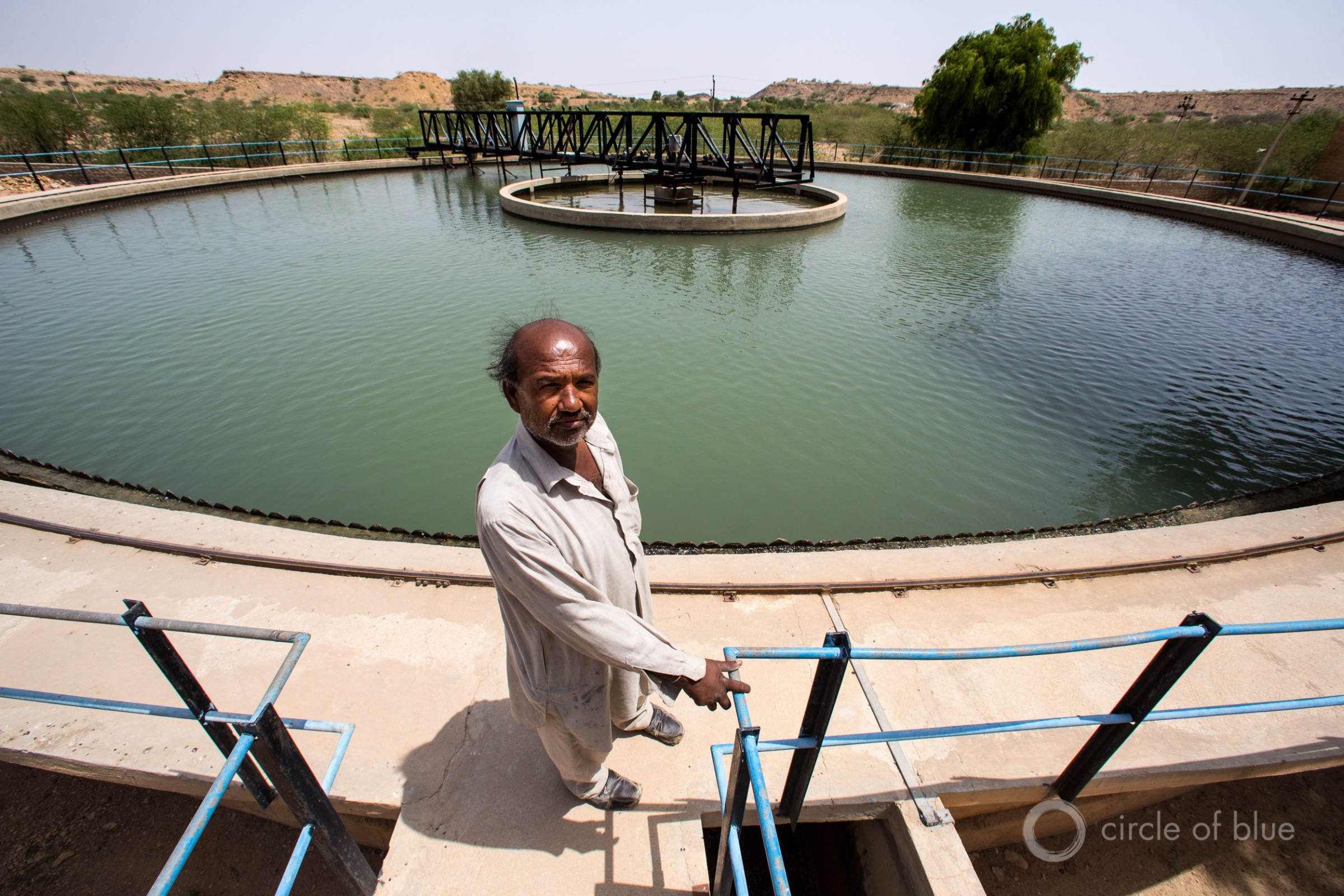
A worker stands in front of a water treatment facility in Jaisalmer, India. Photo © J. Carl Ganter/Circle of Blue
By Brett Walton, Circle of Blue
The global coronavirus pandemic, now in its third month, is precipitating a financial crisis for water utilities in low- and middle-income countries as many of these service providers face drastic cuts in revenue and rising costs to respond to the public health emergency.
Health and public finance experts are deeply concerned that the consequences of burgeoning utility deficits, if not addressed, will reverberate long after the virus subsides. They say that inadequate utility revenue and national financial distress will put at risk broad advances in drinking water access that were made in recent years and jeopardize any hope of achieving loftier goals of universal access set by the United Nations for the next decade.
“If we’re looking at insolvency of water and sanitation service providers, that poses huge risks to universal access goals and threatens hard-won gains on improvements in access rates that we’ve seen in the past decade or two,” Jeff Goldberg, director of the Center for Water Security, Sanitation and Hygiene at the U.S. Agency for International Development, told Circle of Blue.
Health and public finance experts are deeply concerned that the consequences of burgeoning utility deficits, if not addressed, will reverberate long after the virus subsides.
Since 2000, some 1.6 billion people have gained access to basic drinking water services, according to UN and World Health Organization data. Still, about 785 million people do not have piped water in their homes or wells that are protected from contamination.
The coronavirus pandemic is a shock to utility systems that have grown more confident and stable. The most vulnerable utilities, says Joel Kolker, are those that have experienced a “double hit,” meaning substantial revenue declines and rising operating costs.
“The consequences are even bigger than the water utilities,” Kolker, the lead water supply and sanitation specialist at the World Bank Water Global Practice, told Circle of Blue. “It’s really a question of how are we going to keep the taps running in this environment?”
The numbers are not good, Kolker said. Anecdotally, he has seen utility revenue declines between 10 and 50 percent.
Goldberg is also concerned that water — an essential service for preventing the spread of the coronavirus — will be impaired in the financial fallout. He noted a survey by the Water Service Providers Association of Kenya that found that revenue collection is down by 70 percent among its members.
The coronavirus pandemic is a shock to utility systems that have grown more confident and stable.
Several factors explain the declines. Countries in Africa, Asia, South America, and elsewhere went into lockdown starting in March or earlier to slow the virus. Businesses shuttered and factories closed. Water use in the commercial and industrial sector plummeted. That started a ripple effect.
Citing figures from IBNet, a water utility data site, Kolker said that the global average water use is typically 70 percent residential and 30 percent commercial. After months of economic seizure, the split is now more like 82 percent residential and 18 percent commercial.
This drop by nearly half in commercial water use is a big problem for some utilities in low- and middle-income countries. The effect depends on a utility’s water rates and funding sources, but many utilities subsidize the cost of residential service with higher tariffs on businesses. Less income from selling water to cement factories and office parks means less money to serve neighborhoods.
Even utilities in wealthy countries are not immune to the downturn. An American Water Works Association survey conducted at the end of April found that about 40 percent of utilities that responded had cut back on repairs and 30 percent expected to reduce their capital construction.
A drop by nearly half in commercial water use is a big problem for some utilities in low- and middle-income countries.
Revenue is also dropping because national governments in Kenya, Ghana, and elsewhere have ordered utilities to support the public health response by not turning off water to people who do not pay their bills and to provide water via tankers and other means to as many people as possible. These orders are important from a disease-fighting perspective, but worrisome for those who pay attention to financial statements.
“We’re very, very concerned about the longer-term financial solvency of these utilities, particularly smaller-scale water and sanitation providers, due to these mitigation orders,” Goldberg told Circle of Blue.
At the same time costs have increased as utilities spend more on disinfection, protective gear, and worker safety.
How to Fill the Financial Gap
The pandemic is an unusual crisis. The emergencies for which utilities typically plan and encounter are natural hazards like hurricanes and earthquakes. In these scenarios, the damage is physical — pipes rupture, storage tanks crack — and the event is short-lived.
The pandemic has turned the conventional response upside down. “This is a very different problem,” Kolker noted. The effects could extend for months or years if recessions and unemployment make revenue collection difficult politically even when the virus abates.
This is why Goldberg worries about backsliding on water access goals.
To identify utilities at risk, USAID is conducting financial stress tests of large water providers in Kenya, Mozambique, and Zambia, with the possibility of expanding to other countries. The World Bank is developing rapid assessment tools to guide utility leaders and government ministers.
The pandemic has turned the conventional response upside down.
If Kolker’s experience is indicative, financial stress, in its various forms, will be evident across the board. The World Bank’s water program works with 65 countries, and Kolker has been talking with utilities and ministers in all of them.
“They’re all having problems,” he said. “No one has told me everything is running smoothly.”
Not all utilities in low- and middle-income countries are having the same experience, though. The Asian Development Bank works with more than three dozen countries from the Black Sea to the Pacific Ocean.
According to its utility specialists, the bank has not received any financial support request from client water utilities.
Medardo Abad, Jr., a spokesperson, wrote to Circle of Blue that the bank’s analysts believe that revenue impacts will not be so significant for two reasons: people still need to use water even in a lockdown, and water tariffs are rather low in South Asia, so many people can still pay the tariff even with less household income.
For those that do need help there are a few options. National governments can fill the gap. Nana Akufo-Addo, the president of Ghana, declared that the government would cover the water bills of all residents for the months of April, May, and June.
If national governments will not commit those resources, aid agencies and international lenders are another option. USAID has an annual budget of around $400 million for water and sanitation programs, and Goldberg said that the agency is trying to adapt those funds to its coronavirus response. It is working with local partners to extend service to vulnerable communities and to ensure that supplies like chlorine, fuel, and spare parts continue to flow. The World Bank, meanwhile, has pledged $160 billion in grants and loans over the next 15 months. In addition, 73 countries can ask to have loan repayments suspended during the emergency so that those funds can go toward national health and social programs.
In Kolker’s mind, the multi-angled approach is crucial if utilities are to withstand this period of upheaval.
“An emergency at this scale is going to run on for a sustained period,” Kolker said. “So I think this is not one of these things where we can look to the utility to fix it. Has to be a broader discussion.”
Jeff Goldberg is director of USAID’s Center for Water Security, Sanitation and Hygiene, not the Office of Water, as was initially stated.
Brett writes about agriculture, energy, infrastructure, and the politics and economics of water in the United States. He also writes the Federal Water Tap, Circle of Blue’s weekly digest of U.S. government water news. He is the winner of two Society of Environmental Journalists reporting awards, one of the top honors in American environmental journalism: first place for explanatory reporting for a series on septic system pollution in the United States(2016) and third place for beat reporting in a small market (2014). He received the Sierra Club’s Distinguished Service Award in 2018. Brett lives in Seattle, where he hikes the mountains and bakes pies. Contact Brett Walton



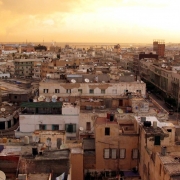

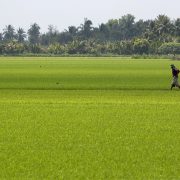
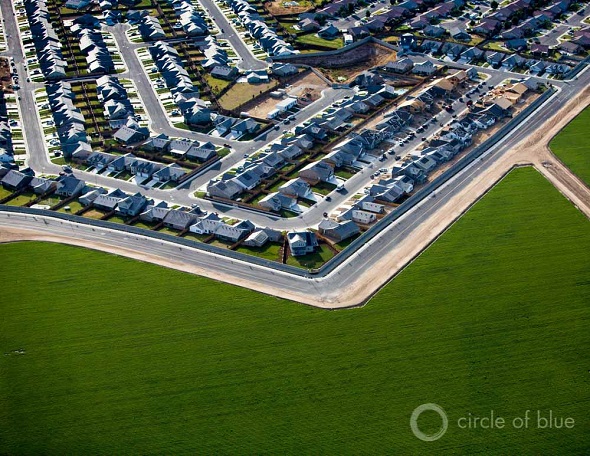
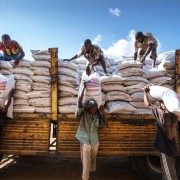




I’d be interested to hear more about impact on India. There is news of the government continuing large capex investment, though surely the utilities already in operation are under a great deal of stress. How are they being impacted and is the government willing to step in?